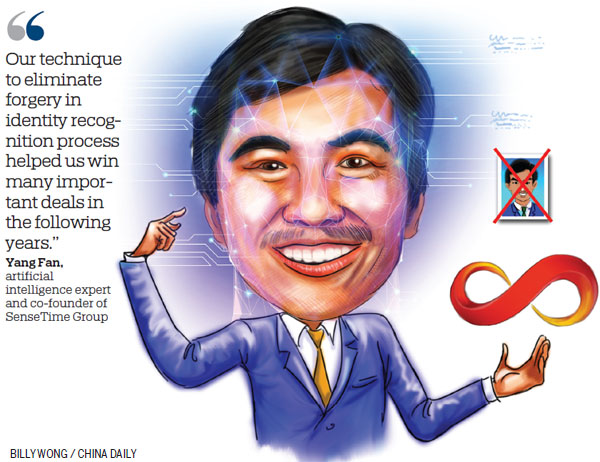AI company learns to adapt to clients' expectations
Updated: 2019-05-24 07:13
By Chai Hua in Shenzhen(HK Edition)
|
|||||||
Editor's note: Artificial intelligence startup SenseTime Group soon learned that its priority needed to be more than developing flashy new technology, but talking to customers about their expectations. Company co-founder Yang Fan explains how that strategy helped curb online scams that were victimizing their clients.
Computer engineer Yang Fan never thought that his first challenge of entrepreneurship would be battling commercial crimes - including a cyber "undercover mission".
Yang, an artificial intelligence expert who graduated from Tsinghua University, worked in Microsoft Research Asia for eight years before co-founding Chinese facial-recognition startup SenseTime Group in 2014. The startup was initiated by another professional with a strong academic background - Tang Xiaoou, a well-known AI scientist and professor at the Chinese University of Hong Kong.

Nowadays, many entrepreneurs have experience similar to Tang's and Yang's. They usually have a pure academic background and try to start their own business by applying the technology they have studied or researched in campuses or laboratories to the real world. But they soon discover that their ability to deal with actual market demand and the feasibility of their products are usually doubted by their clients - and sometimes even by themselves.
SenseTime also faced that challenge in the beginning but survived after a tough fight. It has become the world's most valuable artificial intelligence startup, and the Ministry of Science and Technology selected the company in September to be the fifth member of China's "national team" for AI development.
As the executive responsible for establishing the new firm's technical engineering team and the commercialization of its AI technology from scratch, Yang believes this group of entrepreneurs needs to keep an especially close eye on clients' feedback and needs, and not just focus on the technology.
"In the beginning, our team, which has a strong academic background, faced doubts about the ability of applications in real-life scenarios," he recalled in an exclusive interview with China Daily.
Such a scenario developed in 2015, when some financial companies started to try to enroll new customers online with the help of facial recognition technology. In order to attract new clients, gifts were given out for each registration. SenseTime, which specializes in AI and image recognition, developed its own product to meet the demand, but the company found the business is not simply about technology.
Yang said a bank client found that about 30 percent of the approximately 1 million new nationwide registrations a day were forgeries, using fake photos and identities to trick their facial recognition system. Considering that the gifts, sometimes cash, sent to these fake new "clients", a company could lose millions of yuan every day.
When studying in school or doing research, he never thought this could be such a big problem. "It is not a test of facial recognition technology anymore, but fighting commercial forgery and the comprehensive ability to innovate, as nobody in the market had solved the problem yet."
The startup was not sure exactly how to do it, so it took a measure seemingly not high-tech at all. As the first step, it collected as many image video clips as possible and used them to test and upgrade the system bit by bit so that it could tell the difference between a real person and a digital image.
He remembered very clearly, "It was 7:00 pm on September 30, 2015, just the day before the National Day holiday. We asked all of our employees, about 100 at that time, to collect images of 10 different people, and the result was 2,000 on the morning of the next day."
Many functions that current facial recognition software use now, such as asking the user to blink or nod, were designed at that time, he added.

However, it was not that easy. Yang said "the forgery business" was so mature that it had formed a comprehensive and even high-tech industrial chain. It means the scammers are also upgrading their forgery skills.
In the beginning, photos were used, then a short clip of videos, and later, even animation and 3D models, he said. At the upstream of the chain, there were "teachers" and "textbooks" to teach a number of people in multiple online chat groups that discussed how to make fake identities to pass facial-recognition tests on mobile phone applications.
He said the startup even bought a position in one of those chatting groups as an "undercover" member to keep track of their latest moves.
"About two months of work without weekends, we finally won the battle," Yang said proudly. From then on, their system can automatically upgrade every day, completely knocking down forgeries.
He admitted it was really arduous work but also made their product stand out from their competitors'. "Our technique to eliminate forgery in identity recognition process helped us win many important deals in the following years, such as the cooperation with mainstream mobile-phone makers and telecommunications," he said.
The experience taught Yang that technology is usually the key in a technologist's interpretation of an industry of business, but in reality, unexpected adversity could emerge in any aspect.
His suggestion for entrepreneurs with pure scientific background is to "stand beside your clients" to figure out the real question that needs to be addressed, instead of "immersing yourself in the technology world or even trying to show off your technique."
Currently, he is leading his team in applying image recognition technology in some very down-to-earth scenarios, such as monitoring the kitchen hygiene of restaurants and the level of truck drivers' fatigue.
Meanwhile, the startup still keeps unique academic cultures, like reading scientific papers together.
grace@chinadailyhk.com
(HK Edition 05/24/2019 page8)